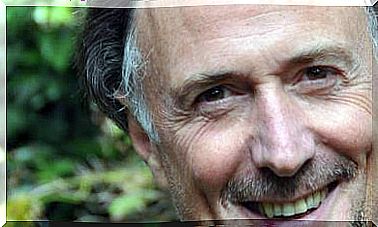“Western Culture Is Based On Three Misconceptions”
Author of works on ecology, spirituality, social justice and pacifism, he is co-founder, along with the Dalai Lama, of committed Buddhism.

The Buddhist writer and activist Sulak Sivaraksa has become an emblem for a whole sector of Thai youth, who dreams of a less “developed” but more just, humane and sustainable country, capable of drawing on its history and traditional values to look confidently into the future.
Defender of the rural and urban poor, this octogenarian is one of the leaders of the popular resistance against the excesses of globalization and economic developmentalism that are radically transforming the country.
Accused on several occasions and sentenced to exile for openly criticizing the policies of the powerful King Bhumibol Adulyadej (branch IX), Sivaraksa remains true to his convictions and speaks with the calm that half a century of peaceful resistance affords him behind his back.
Interview with Sulak Sivaraska
Thailand is currently the second strongest economy in Southeast Asia. How do you rate this spectacular growth?
My assessment is not very positive. Modern economic culture has contributed to the deterioration of classical moral values and the spiritual vision of the world, disrupting the understanding of human existence and what constitutes a good and happy life. Development is exclusively material, at the expense of the environment and a fair distribution of wealth.
You are very critical of the consumer society.
At a deep level, consumption receives its vitality from the illusion of autonomy of the individual, which Western culture artificially separates from the innate bond with his peers and nature. A human being alone, thrown into the world, with an existence independent of his social and affective relationships with other living beings. This illusion of “I” is for Buddhists the main cause of suffering. We become ontologically strange to others and to ourselves. We can only fulfill ourselves in the act of consuming: “I buy, therefore I exist,” Descartes would say today.
Capitalist industry creates artificial needs for us. We become individualistic, mechanical, and selfish.
This illusion of separation, is it responsible for the destruction of the environment?
I would say yes. Western culture is based on three misconceptions: that humanity is independent of nature, that human beings are the owners of the earth, and that happiness results from acquiring material goods.
But nothing is isolated …
Of course. The world is a cooperative whole, a network of relationships where everything is linked to everything: without Mother Earth we cannot survive, without trees or rivers … And to pretend that we are owners of the planet is absurd. In India, for example, the state of Rajasthan has declared that every drop of rain belongs to the government, which will give the appropriate concessions to private companies to sell and buy it. How can you own the rain? As for the happiness of consuming, we know from experience that it is momentary …
Why do we like to buy so much?
Human beings come into the world with the feeling of not being complete, a feeling that capitalist industry takes advantage of to create artificial needs and produce objects that “guarantee” their satisfaction. It creates the illusion that with them we can be more attractive, avoid pain, illness, old age, even death. Consumption is directed exclusively at the mental, material and economic dimension of the human being; it enhances ignorance, hatred and greed – the three main causes of suffering according to the Buddha – and excludes other more authentic aspects. We become individualistic, mechanical, and selfish.
Can we avoid it?
Yes, if we limit our greed and greed. if we are aware that we do not need more, that we can live more austere, simpler, feel lighter with less. And if we practice generosity: this is how we understand to what extent our well-being and survival depend on the quality of our commitment to other living beings. In addition, it is the best antidote to fear, because it reinforces confidence in life.
It is about finding peace and happiness within ourselves.
And also outside. Since everything is interconnected, if you only care about your happiness, you will create more suffering. On the other hand, if you worry about that of others, you also help yourself. You rise from the mental to the spiritual through others. And I’m not just talking about human beings; I mean all sentient beings. This is what Buddhist philosophy says, but you must learn how to practice it.
So what is wealth to you?
Some years ago, James Wolfensohn, the former president of the World Bank, asked me a similar question: What is prosperity from a Buddhist point of view? My answer was: to be prosperous is to be present, with full attention in every moment; it is to be self-sufficient, that is, not to depend on distant sources for your subsistence; and feel satisfied with what you have. On an ecological level, prosperity is defined as “more beings”. The greater the biodiversity, the more likely it is to achieve enlightenment that can only be done collectively.
For that we would have to take care of the Earth …
Yes, but not only thinking about ourselves, about obtaining clean resources, water and air in an instrumental way, as some ecologists claim. We should take care of all sentient beings because they are our equals and deserve love and respect. In addition, nature also takes care of us. To believe only that we protect her is an illusion lacking in humility.
How would you define Buddhism?
It is a technique to help us get out of our isolation. When practiced consciously, it transforms greed into generosity, hatred into compassion, and ignorance into wisdom. Its essence is non-violence and the interconnection of all beings. Contrary to consumer society, it invites us to face suffering; to realize that it is inevitable to grow old, to die. And to understand its causes.
Everything is connected: if you only care about your happiness, you create suffering. If you care about others, you help yourself.
I did not know that there were “activist Buddhists.”
It does not surprise me. Spirituality, in the West, has spread as a form of escapism. For true Buddhism, we only grow spiritually through commitment to other beings. There is no other way. By practicing compassion, we learn to recognize the suffering of others and try to alleviate it. We live with those who grieve and we share their pain. Those of us who belong to the middle class, for example, reach out to the poor not to help them, but to learn from them. In this country, hundreds of Buddhist monks have risked their lives to prevent deforestation and indiscriminate exploitation of forests. This is the true practice.
Do you think education could change the system?
Western education fosters the illusion of the ego and is based on the lust for knowledge and diplomas. Furthermore, it tends to alienate children from their peers and from nature. The school system always goes one way, from teacher to student, when it should go in two directions: both can learn from each other. If you are humble, you are open and you learn from all beings. We can also learn from trees …
Can you give us any advice?
Breathing consciously, feeling the love, can help you restructure your consciousness. This is how you learn to rise to all levels: physical, mental, spiritual. And observe the way you think, because thinking can be helpful, but also harmful.
Maybe meditate?
Through meditation a state of joy, tranquility and harmony with oneself and with others is reached. But you must choose the right type of meditation, which does not promote escapism: it must lead you to confront yourself with suffering and act to eradicate the violence that exists in society. Every activist should meditate and every meditator should be activated.
Engaged Buddhism
“Economics does not have to be Buddhist, as the title of my book says, but it must become spiritual,” says Sulak Sivaraksa in The Wisdom of Sustainability (Dharma).
The work offers alternatives to globalization based on the principles of Buddhism and personal development : community, sustainability, small-scale and defense of indigenous people and the rural world.









